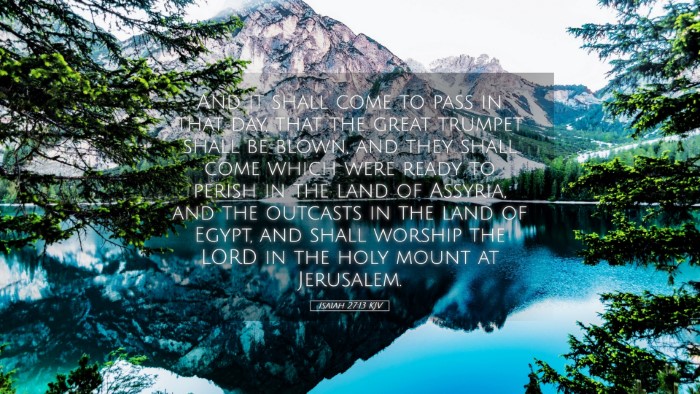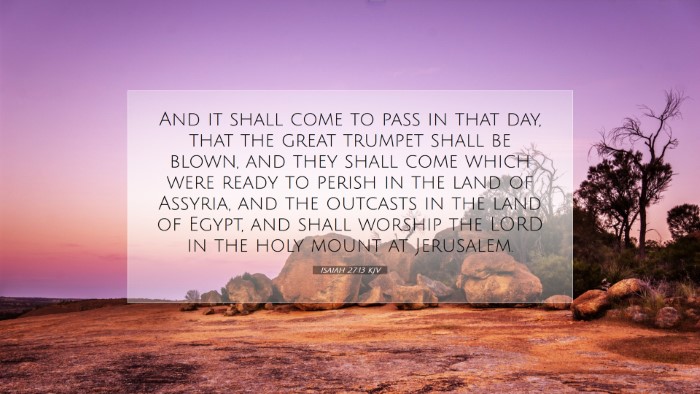Commentary on Isaiah 27:13
Isaiah 27:13 reads: “And it shall come to pass in that day, that the great trumpet shall be blown, and they shall come which were ready to perish in the land of Assyria, and the outcasts in the land of Egypt, and shall worship the Lord in the holy mount at Jerusalem.” This verse speaks profoundly of hope and restoration, echoing themes prevalent in the prophetic literature of Isaiah. Below, we delve into various commentaries that offer insights into this important passage.
Contextual Overview
Isaiah is a pivotal book in the Old Testament, addressing both judgment and deliverance. The preceding chapters discuss the fall of Jerusalem, judgment against Israel's enemies, and ultimately the future restoration of God's people. Thus, Isaiah 27:13 becomes a climactic point of focus on the theme of redemption.
Insights from Matthew Henry
Matthew Henry notes the significance of the “great trumpet” in this passage, emphasizing its role as a call for God’s people to gather from the lands of their exile. This trumpet symbolizes a divine summons—a call to worship and a return to the holy place.
- Exile and Restoration: Henry reflects on the scattered state of the Israelites, particularly those in Assyria and Egypt, and reminds readers of God’s promise to restore His people. He correlates this to the notion of spiritual redemption and the ultimate act of coming together in worship.
- Worship in the Holy Mount: The reference to worshipping “in the holy mount at Jerusalem” speaks to the centrality of Jerusalem in Jewish worship and the anticipation of communal worship restored after exile. This echoes the messianic hope in which Christ, the fulfillment of the Law, enables true worship.
Reflections by Albert Barnes
Albert Barnes offers a theological perspective, focusing on the prophetic implications of this gathering. He interprets the trumpet’s sound as a divine signal for the resurrection and the gathering of God's faithful remnant.
- Signal for Resurrection: Barnes sees a dual meaning in the trumpet—the immediate context of returning from exile and a foreshadowing of the ultimate resurrection of believers. This aligns with New Testament imagery, particularly in 1 Thessalonians 4:16, where the trump of God is mentioned.
- Inclusivity of God’s People: Barnes points out that the verse signifies an open invitation to all who were “ready to perish,” highlighting God's grace that extends even to those who feel lost and hopeless.
Commentary from Adam Clarke
Adam Clarke emphasizes the prophetic nature of Isaiah’s message, connecting it to the broader narrative of salvation history. He elaborates on the geographical references mentioned and the symbolic meanings they convey.
- Geographical Significance: Clarke elucidates how Assyria and Egypt represent external threats to the Israelite nation, yet their mention in a hopeful context underscores God’s sovereignty over the nations and His power to redeem from any circumstance.
- The Great Trumpet: He correlates the trumpet to the ancient practice of signaling significant events, akin to a call to arms or a declaration of good news, which in this case, is the good news of salvation.
Theological Implications
The insights drawn from these commentaries lead to several theological implications:
- The Nature of God’s Call: The trumpet signifies God’s authoritative call to His people, a reminder that divine intervention leads them back to Him. It serves as encouragement for modern-day believers to respond to God’s call in their lives.
- Restoration Motivation: The verse reassures believers that despite their circumstances, God’s desire is for restoration—an important reminder for those in ministry and scholarship, particularly regarding pastoral care and community healing.
- Unity in Worship: The anticipation of worship in Jerusalem points to a future gathering of believers, reinforcing the communal aspect of faith. The church today is encouraged to pursue unity in worship, much like the anticipated gathering described in this verse.
Conclusion
Isaiah 27:13 serves not only as a profound promise of restoration and hope for the Israelites in exile but also speaks to all believers today. The prophetic invitation to worship opens the doors of redemption through Christ, uniting the faithful from all walks of life. The commentaries by Matthew Henry, Albert Barnes, and Adam Clarke collaboratively enrich our understanding and help us appreciate the depth of God’s redemptive plan.


